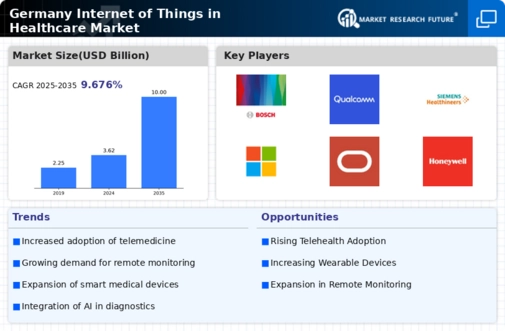Government Initiatives and Funding
Government initiatives in Germany are playing a crucial role in propelling the internet of-things-in-healthcare market forward. The German government has launched various funding programs aimed at promoting digital health technologies, including IoT solutions. For instance, the Digital Healthcare Act encourages the adoption of digital health applications, which include IoT devices for monitoring and managing health conditions. This legislative support is expected to increase investment in the internet of-things-in-healthcare market, with funding allocations reaching up to €200 million annually. Such initiatives not only foster innovation but also enhance the overall healthcare infrastructure, making it more conducive for the integration of IoT technologies. Consequently, the internet of-things-in-healthcare market is likely to benefit from these supportive policies, leading to accelerated growth and development in the sector.
Growing Focus on Preventive Healthcare
The internet of-things-in-healthcare market is witnessing a growing focus on preventive healthcare in Germany. This shift is largely driven by the increasing awareness of the importance of early detection and management of health issues. IoT devices, such as wearables and smart health monitors, facilitate proactive health management by providing real-time data to both patients and healthcare providers. Recent studies indicate that preventive healthcare measures can reduce healthcare costs by up to 30%, making it an attractive option for both patients and insurers. As a result, the demand for IoT solutions that support preventive care is expected to rise, thereby contributing to the expansion of the internet of-things-in-healthcare market. This trend underscores the potential for IoT technologies to transform traditional healthcare paradigms into more proactive and efficient systems.
Advancements in Connectivity Technologies
Advancements in connectivity technologies are significantly influencing the internet of-things-in-healthcare market in Germany. The rollout of 5G networks is expected to enhance the performance of IoT devices, enabling faster data transmission and improved connectivity. This technological evolution allows for more reliable and efficient communication between devices, which is essential for real-time health monitoring and data sharing. As 5G becomes more widely available, the internet of-things-in-healthcare market is likely to see an influx of innovative applications that leverage this enhanced connectivity. Moreover, the integration of edge computing with IoT devices can further optimize data processing, reducing latency and improving response times. Consequently, these advancements are poised to drive the growth of the internet of-things-in-healthcare market, facilitating the development of smarter healthcare solutions.
Increased Consumer Awareness and Engagement
Increased consumer awareness and engagement are emerging as pivotal drivers for the internet of-things-in-healthcare market in Germany. As patients become more informed about their health and the available technologies, there is a growing demand for IoT-enabled health solutions. This trend is reflected in the rising adoption of health apps and wearable devices, which empower individuals to take charge of their health. Surveys indicate that approximately 60% of consumers in Germany are willing to use IoT devices for health monitoring, highlighting a shift towards more active participation in personal health management. This heightened engagement not only fosters a culture of health consciousness but also encourages healthcare providers to adopt IoT technologies to meet patient expectations. As a result, the internet of-things-in-healthcare market is likely to experience robust growth driven by this increasing consumer involvement.
Rising Demand for Remote Patient Monitoring
The internet of-things-in-healthcare market in Germany is experiencing a notable surge in demand for remote patient monitoring solutions. This trend is driven by an increasing emphasis on patient-centric care, which allows healthcare providers to monitor patients' health conditions in real-time. According to recent data, the remote patient monitoring segment is projected to grow at a CAGR of approximately 25% over the next five years. This growth is largely attributed to the aging population in Germany, which necessitates continuous health monitoring. Furthermore, the integration of IoT devices enables healthcare professionals to collect and analyze patient data efficiently, leading to improved health outcomes. As a result, the internet of-things-in-healthcare market is likely to expand significantly, driven by the need for innovative solutions that enhance patient care and reduce hospital readmissions.
















